牛津译林版七下英语U2grammar2
牛津译林版英语七年级下册Unit2 Grammar精品学案
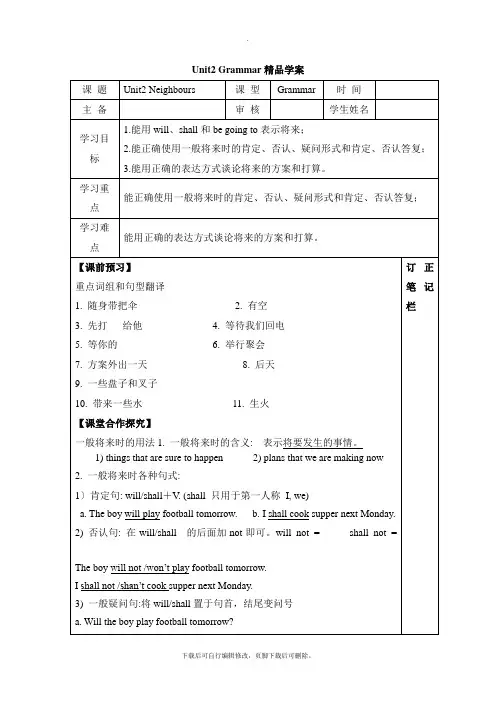
9.一些盘子和叉子____________
10.带来一些水__________________11.生火____________________
【课堂合作探究】
一般将来时的用法1.一般将来时的含义:表示将要发生的事情。
三、完成句子:1.下个假期你打算干什么?
What are youfor your next holiday?
2.你或是明天来,或是后天来。
You can come either tomorrow or.
3.他将生火。He.
4.突然,那座老房子着火了。
Suddenly, the old house is.
A. builds B. will build C. build D. building
( ) 2.—Where is your brother?
—He is in Beijing. Heback in three days.
A. will come B. comes C. coming D. come
4)特殊疑问句:特殊疑问词+will/shall +主语+动词原形+其他?
练一练:句型转换:1) Amy willdo her homeworktonight.
(否认句)Amy ________ _________ her homework tonight.
(一般疑问句) _______Amy _________ her homework tonight?
Unit2Grammar精品学案
课题
Unit2 Neighbours
课型
2023~2024 学年 Unit 2 Grammar(25页)英语牛津译林版七年级下册课件
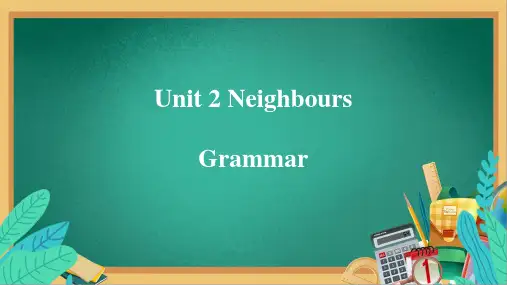
Let's practise
4.特殊疑问句: 特殊疑问词 + will/shall + 主语 + v. +... When shall I cook supper?
Who will you wait for?
What will Andy do next Monday? 对划线部分提问: 1. The flat will belong to Tom next year. Who will the flat belong to next year? 2. My mother will carry all the food. Who will carry all the food? 3. I will eat noodles this evening. When will you eat noodles? 4. Amy will do her homework tonight. What will Amy do tonight?
the day after tomorrow in +一段时间 ……之内
(在)将来
后天 after+时间点
……之后
一般将来时两种基本句式的区别:
● 在初中阶段来讲,”be going to+动词原形”和“will+动 词原形”这两种表示将来时态的结构没什么区别。但在现代 英语中,特别是在口语中,表示将来时多用“be going to+动 词原形”这一形式。另外他们主要区别在于“be going to+动 词原形”表示一个事先考虑好的意图,相当于“打算、计划、 准备”,而will则表示未经事先考虑的意图。
表示决定、打算将来要做的事情 I’m going to visit our new neighbours. 2. things that will probably happen 表示根据某种迹象推断很可能要发生的事 It’s so cloudy. I think it’s going to rain.
初中英语七年级下册(牛津译林版)Unit2Grammar教学设计
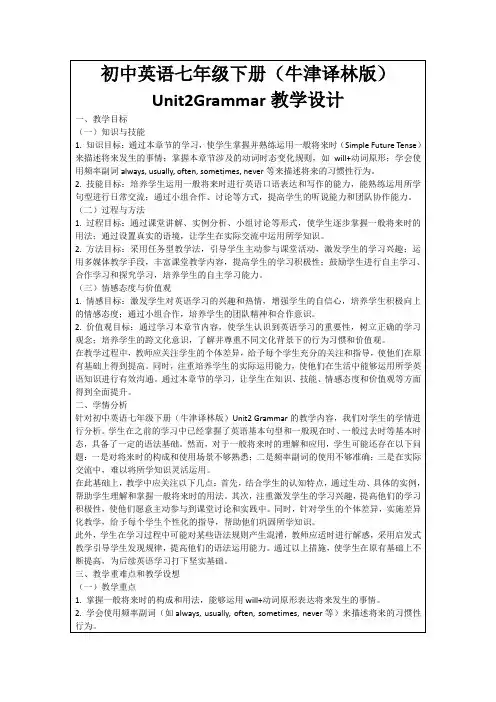
1.对一般将来时的理解和应用,特别是动词时态变化的掌握。
2.频率副词的用法,如何正确运用它们来描述将来的习惯性行为。
3.将所学知识应用于实际交流中,提高学生的口语表达和写作能力。
教学设想:
1.创设情境,激发兴趣:通过呈现与学生生活密切相关的情境,如谈论周末计划、未来梦想等,引发学生对一般将来时的关注,激发他们的学习兴趣。
2.分步教学,循序渐进:将教学内容分解为若干小步骤,逐一讲解、练习。从简单句型到复杂句型,从单一语境到多元语境,帮助学生逐步掌握一般将来时的用法。
3.任务型教学,注重实践:设计各种实践活动,如小组讨论、角色扮演、写作练习等,让学生在实际操作中运用所学知识,提高他们的语言表达能力。
4.差异化教学,关注个体:针对学生的个体差异,给予个性化的指导,帮助他们在原有基础上提高。对学习困难的学生,采用辅导、同伴互助等方式,帮助他们克服难点。
(五)总结归纳
1.教学内容:对本节课的教学内容进行总结,强调一般将来时的构成、用法以及频率副词的运用。
2.学生反馈:邀请学生分享他们在课堂练习中的收获和困惑,鼓励他们提出问题,共同解答。
3.教师总结:针对学生的反馈,教师进行针对性的解答,巩固所学知识,并鼓励学生在课后继续练习,将所学知识运用到实际生活中。
二、学情分析
针对初中英语七年级下册(牛津译林版)Unit2 Grammar的教学内容,我们对学生的学情进行分析。学生在之前的学习中已经掌握了英语基本句型和一般现在时、一般过去时等基本时态,具备了一定的语法基础。然而,对于一般将来时的理解和应用,学生可能还存在以下问题:一是对将来时的构成和使用场景不够熟悉;二是频率副词的使用不够准确;三是在实际交流中,难以将所学知识灵活运用。
牛津译林版七年级英语下册Unit2 Grammar(2)课件
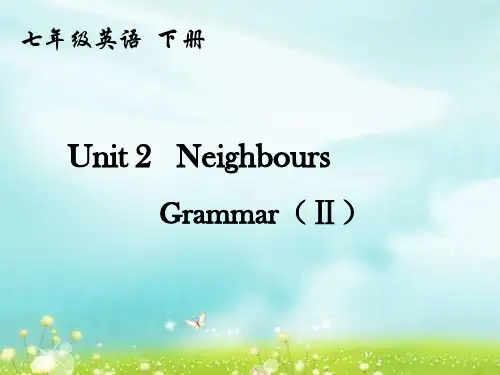
明天下午计划在青少年活动中心进行一个聚会。
Planning a day out
Simon is going to buy some
food.
Annie is going to buy some
plates and forks.
Planning a day out
Simon’s parents is going to bring(bring) some
七年级英语 下册
Unit 2 Neighbours
Grammar(Ⅱ)
It is so cloudy. It _i_s_ _g_o_i_n_g_
to __ra_i_n__.
We _a_r_e _g_o_in__g to take the underground
to the city centre.
谢谢观赏
You made my day!
我们,还在路上……
1. 有些动词如:come, go, leave等,其现 在进行时可表示将来时;
eg. (1)We are leaving on Sunday.
(2)Lisa is coming back from New York tomorrow.
(3)Is your father going to the USA soon?
2. There be的将来时:
(1)There will be …
There will be a match here tomorrow.
这里明天将进行一场比赛。
(2)There is/are going to be …
T_h_e_r_e_is_ _g_o_in_g_ _t_o_ _b_e_ a party at the _y_o_u_t_h_ c_e_n_t_r_e tomorrow
牛津译林版英语七年级下册Unit2Grammar一般将来时讲义
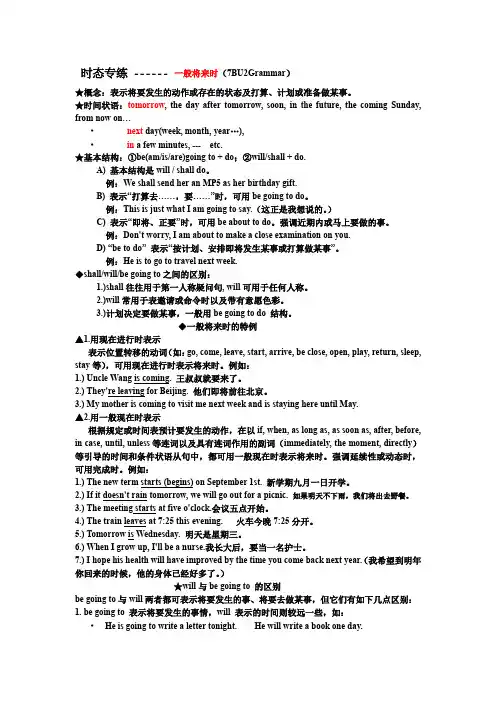
时态专练 ------ 一般将来时(7BU2Grammar)★概念:表示将要发生的动作或存在的状态及打算、计划或准备做某事。
★时间状语:tomorrow, the day after tomorrow, soon, in the future, the coming Sunday, from now on…•next day(week, month, year…),•in a few minutes, ---etc.★基本结构:①be(am/is/are)going to + do;②will/shall + do.A) 基本结构是will / shall do。
例:We shall send her an MP5 as her birthday gift.B) 表示“打算去……,要……”时,可用be going to do。
例:This is just what I am going to say.(这正是我想说的。
)C) 表示“即将、正要”时,可用be about to do。
强调近期内或马上要做的事。
例:Don't worry, I am about to make a close examination on you.D) “be to do” 表示“按计划、安排即将发生某事或打算做某事”。
例:He is to go to travel next week.◆shall/will/be going to之间的区别:1.)shall往往用于第一人称疑问句, will可用于任何人称。
2.)will常用于表邀请或命令时以及带有意愿色彩。
3.)计划决定要做某事,一般用be going to do 结构。
◆一般将来时的特例▲1.用现在进行时表示表示位置转移的动词(如:go, come, leave, start, arrive, be close, open, play, return, sleep, stay等),可用现在进行时表示将来时。
译林牛津版七年级下册英语Unit 2 课时4 Grammar (2)
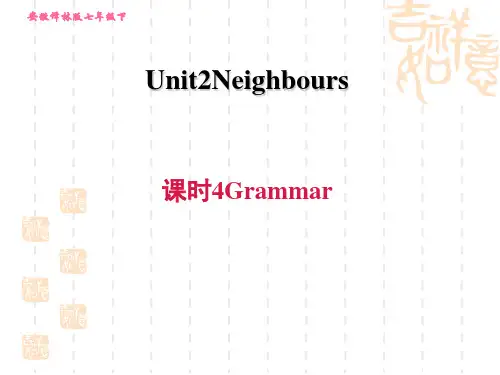
语法通关练
10 Willyougo; Yes; Ishall 11 aregoingtohelp
能力提升练
14 D
答案呈现
15 D
12 Whatare; goingtobe; you 16 C
13 won'tmeetany
17 B
一、用所给词的适当形式填空。 1. _________we_________(talk)
四、阅读理解。
14. MrBrownandMrSmithare______.
A. brothersB. twins
D
C. friendsD. neighbours
【点拨】根据原文第一段中句子 TheBrownsaretheSmiths’ neighbours.可知答案。
15. Peoplecall____D__“MrGoing-to-do”. A. MrsSmithB. Dick C. MrSmithD. MrBrown
【点拨】根据原文第一段中句子 MrBrown’sfirstnameisJohn. Butwhenhisneighbourstalkabouthim, theycallhim “MrGoing-to-do”.可知答案。
16. MrBrownalwayssaysheisgoingtodosomething, buthe______doesit. C
牛津译林版七下:unit2 Neighbours Grammar(共10张PPT)
Let’s practice.
1. He usually (wash) his hands before meals. 2. Look, what he (do )? He (play) the piano. 3. Tomorrow is Saturday. I (help) my mother with housework. 4. What you to do? I to check my computer.
GUESS ?????
• Visit Xuanwu Lake • Watch a film • Have a fashion show • Help old people clean their flats • Do some shopping • Help my mother with housework
C: What is he/she going to do this
weekend?
• Go to the dancing lesson • Do some reading • Go on a picnic • Check the broken computer • Fix a bicycle • Go fishing
Unit 2 Grammar (2) be going to
What are you going to do?
• 英语教学辅助视频\what are yo
• • • • • 表示计划、打算要做某事 表示即将发生的事 be 有 am , is,are 变否定,be 后not 为标记 变问句,be提前,句尾问号要记全。
Planning the weekend
• • • • A: What are you going to do this weekend? B: Have a guess. A: Are you going to …? B: Yes, I am./No, I am not. I am going to….
牛津译林版七年级下册Unit2-Grammar课件
结构
肯定: 主语 + am/is/are going to + 动词原形 + 其他。 否定: 主语 + am/is/are not going to + 动词 原形 + 其他。 疑问: Are/Is/Am + 主语 + going to + 动词 原形 + 其他?
Notes
1) be going to 表示将来的打算,有时并 没有特定的将来时间状语。
I will/shall = I’ll I will not = I won’t I shall not = I shan’t
Mr Lin: Hello, Simon. Do you need any help?
Simon: Yes, Mr Lin. There’s something wrong
C. is; Shall D. are; Shall
2. —Maths is too difficult for Tom.
—Really? But it ____ a problem if he
works hard.
A. will be
B. doesn’t
C. won’t be
D. is
II. 用括号内所给动词的适当形式填空。 1. Our motherland (祖国) w__il_l_b_e_ (be)
Amy: How about your uncle? Simon: He _is__g_o_in_g__t_o_m__a_k_e_ (make) a fire. Amy: And your aunt? What __is_ she
__g_o_in_g__t_o_d_o_ (do)? Simon: She _i_s _g_o_in_g__t_o_c_o_o_k_ (cook) some
译林版牛津版英语七年级下册Unit2-Grammarppt课件
• next week/ month/ year/ …
• this afternoon/ evening/ Friday/ month/ …
• in the future
• in a few years/ in 10 minutes/ in 2 days
• soon
football team _will____wi___n____ (win) in this match.
2 . Mary’ s birthday is next Monday , her
mother
l_g_ v_e___ (give) her a present.
3.What ___a_r_e___ you g_o_ n_g_ _ (do) after
5 4 3 2 1
改否定句/一般疑问句
1.Helen is going to read books in the library next weekend. 2.Jim will do his homework this evening. 3.There are going to be two cinemas here. 4. There will be a film tomorrow.
• He will be 2 0 years old next year.
• Tomorrow will be Saturday.
• It will be my birthday tomorrow.
4.be going to do 和will 的区别
• 4). 在有条件从句的主句中,一般不用be going to,而多用will.
8.Mike’s father __
2017牛津译林版七年级下册Unit2NeighboursGrammar2
Unit 2 Neighbours Grammar2【学习目标】1.能学会使用be going to 谈论将来要发生的事情。
2.能正确使用一般将来时的肯定、否定、疑问形式和肯、否定回答。
【学习重难点】正确使用be going to 谈论将来要发生的事情。
【自主学习】(认真阅读课文,完成知识梳理,在课本上做好标注)『基础知识』A、重点短语:写下列短语并用红笔批改订正。
1、拜访我们的新邻居__________________2、计划一天出游__________________3、后天__________________4、带来一些水__________________5、生火__________________6、烧饭__________________B、重点句子:(尝试翻译下列句子并在课本上用用红色笔划出来):1.我打算去拜访我的新邻居。
2. 她打算下周五看电影。
3. 他打算生火。
4她打算做什么?5.她打算做饭。
『合作探究』---语言点知识运用与拓展(参考课文注释、参考资料,自我探索总结,C层初步思考,AB层认真思考,全部完成,为课堂交流做好准备)小组讨论,解决预习中的疑难点。
be going to结构的含义:1.表示计划、打算或在不远的将来要做某事2.表示将可能发生的事be going to结构: be going to + v.原形be going to各种句式:1.肯定句: be going to+v.原形2.否定句: be+not+going to +v.原形3.一般疑问句: 将be置于句首4.一般疑问句回答: 肯定:Yes, 人称代词+ be;否定:No, 人称代词+be+not5.特殊疑问句:1)疑问词+be+主语+going to+v.原形例如:他打算住哪一层?Which floor is he going to live on?2)对主语提问: 疑问词+is+going to+v.原形+其他将来时的典型标志: tomorrow (morning/afternoon…);next Tuesday/week/month…this morning…./Sunday…;tonight…【课堂达标检测】一、根据句意填入适当的单词。
- 1、下载文档前请自行甄别文档内容的完整性,平台不提供额外的编辑、内容补充、找答案等附加服务。
- 2、"仅部分预览"的文档,不可在线预览部分如存在完整性等问题,可反馈申请退款(可完整预览的文档不适用该条件!)。
- 3、如文档侵犯您的权益,请联系客服反馈,我们会尽快为您处理(人工客服工作时间:9:00-18:30)。
•
• 在含有条件状语从句或时间状语从句的 复合句中,从句用一般现在时,主句用 将来时,且用will而不用be going to。 如:
[来源:z x x k 学科网]
1. They are going to play football next Sunday . (肯定句) ______________________________________ (否定句) ______________________________________ (一般疑问句) Yes, they are./ No, they aren’t. _______________________________________? (特殊疑问句) 2. We shall/will meet at the school gate tomorrow morning. (肯定句) ______________________________________________________ (否定句) ____________________________________________________ (一般疑问句)[来源:z x x k 学科网]
• Mum will go to Beijing if it doesn’t rain tomorrow. a new bike in your garden.
[来源:z x x k 学科网]
•
1、Tomorrow is Sunday. Susan(visit)her garden. 2、Look! The boys (start) a campfire. we (cook )some food? 3、Thank you for (come)!The party (begin) soon. 4、Please stop (talk). The teacher is coming. 5、Would you like(carry) this bag for me? 6、I think our team ______(win) the football match next week. 7、Why not (take ) another route? 8、We_____( go ) on a trip if it ______( not rain ) next week . 9. Look at the cloud. It _______ (rain). 10. ----______you______(join) the farewell party next Sunday? ----No, I _______.
Yes, we shall (will)./ No, we shan’t (won’t) ______________________________________________________ _ (特殊疑问句)
•
• tomorrow/ in the future • tonight • in a few minutes/two days • soon • some day • next Tuesday/week/ year • the coming Sunday • this afternoon/Sunday
•
初中英语课件
金戈铁骑整理制作
•
1.My father will come back in 3 days. How soon will your father come back? 2.明天有两个会议。(2) 3.今晚有一场电影。(2)
• There will be two meetings tomorrow. • = There are going to be two meetings tomorrow
